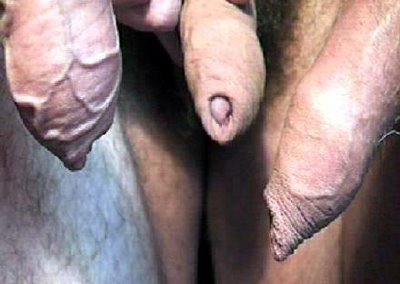 It may not be the "magic pill" to cure HIV and Aids, but circumcision could drastically reduce the rate of the killer disease.
It may not be the "magic pill" to cure HIV and Aids, but circumcision could drastically reduce the rate of the killer disease.Researchers have found that the virus spreads faster in areas where male circumcision was not regularly performed.
Studies have found that HIV incidence in the entire population could be reduced by one-third if there was 100 percent circumcision rate among men. They found that 80 percent of male HIV infections in the world happened through the foreskin of the penis, which was more susceptible to scratches and tears during intercourse.
Conducted by Dr Thomas Quinn from the Johns Hopkins University in Baltimore in the US, the study focused on 137 uncircumcised men with HIV infected partners, and 50 circumcised men with HIV infected partners.
Of the uncircumcised men, 40 eventually became infected with HIV, but not one male among the circumcised group contracted the virus. The research was conducted in Orange Farm, south of Johannesburg, in 2003 and released in 2005 and the subjects were men aged between 18 and 24.
Researchers concluded that circumcision could offer 6 percent prevention from infection.
Fiona Scorgie, senior research fellow at the Centre for HIV and Aids Networking at the University of KwaZulu-Natal, said that Aids intervention specialists were taking the issue seriously.
But she cautioned that male circumcision was no "magic pill" to reduce HIV infections. There were many social and cultural factors to take into account, she said, chief among these was the logistics of implementing this intervention on a mass scale, if it should come to that."But given that our existing HIV prevention approaches (abstain, reduce the number of sexual partners, use a condom) are not having the kind of impact we need, perhaps it is time for us to begin to think creatively about whether new strategies are needed."

Risk Nyami Mbjele, an Aids counsellor at the Clermont Resource Centre, said circumcision would not protect women as they would still be at risk.
"I believe that condoms are safer; this would be high-risk behaviour and it would be wrong for people to believe in it. As Zulus, it is not part of our culture and culture is one thing that should also be considered.
Similarly, Sithembiso Mkhize, spokesperson for the Treatment Action Campaign in KwaZulu-Natal, said although circumcision was a part of many cultures, it was wrong to assume that it could stop the spread of HIV and Aids.
Mkhize said while there had been extensive research, it was something that should not be taken to heart because thousands of people, especially young adults, were at risk.
"We can't take chances with our lives, people are at a big risk whether they are circumcised or not. Use a condom and protect yourself and your partner."
Health department spokesperson Leon Mbangwa said it would be unrealistic to look at circumcision as a cure for the pandemic. "It wouldn't go well with the message we are trying to bring across right now - and that is to condomise. Our people must abstain, be faithful and not have unprotected sex."
However, Francois Venter, clinical director of the Reproductive Health and HIV Research at the University of Witwatersrand, who presented the Orange Farm research last year, urged the adoption of male circumcision as the most effective method for HIV and Aids.
But he said while the results were phenomenal, "we need to wait for another study to prove that it actually works".
"These studies are phenomenal, but male circumcision is not the only thing that will prevent HIV. It's just one of the things. Although the risk is still there, it decreases the infection rate."
from IOL
No comments:
Post a Comment